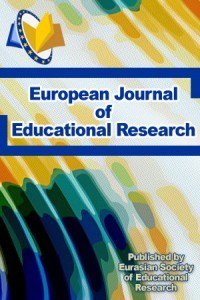The Impact of Conversations on Fourth Grade Reading Performance - What NAEP Data Explorer Tells?
Reading performance, National Assessment of Educational Progress, NAEP
The Impact of Conversations on Fourth Grade Reading Performance - What NAEP Data Explorer Tells?
___
- American Association for the Advancement of Science. (1994). Benchmarks for science literacy. New York: Oxford University Press.
- Bacon, S. (2005). Reading coaches: Adapting an intervention model for upper elementary and middle school readers. Journal of Adolescent & Adult Literacy, 48(5), 416-427.
- Baguley, T. (2009). Standardized or simple effect size: what should be reported? British journal of psychology, 100(Pt 3), 603–17.
- Cheng, K. H., & Tsai, C. C. (2014). The interaction of child–parent shared reading with an augmented reality (AR) picture book and parents' conceptions of AR learning. British Journal of Educational Technology.
- Chohan, S. K. (2011). Any letter for me? Relationships between an elementary school letter writing program and student attitudes, literacy achievement, and friendship culture. Early Childhood Education Journal, 39(1), 39-50.
- Cohen, J. (1977). Statistical power analysis for the behavioral sciencies. Routledge.
- Cohen, J. (1988). Statistical power analysis for the behavioral sciences (2nd ed.). Hillsdale, NJ: Lawrence Erlbaum.
- Feiker Hollenbeck, A. R. (2013). Beyond talking about books: Implications of the reading comprehension instruction and pedagogical beliefs of a special educator perceived as effective. Learning Disability Quarterly, 36(2), 112-125.
- International Society for Technology in Education. (2014). ISTE standards: Teachers. Retrieved from http://www.iste.org/docs/pdfs/20-14_ISTE_Standards- T_PDF.pdf
- Ivey, G. (2014). The social side of engaged reading for young adolescents. The Reading Teacher, 68(3), 165-171.
- Jackson, V. (2016). Applying the Think-Aloud Strategy to Improve Reading Comprehension of Science Content. Current Issues in Education, 19(2).
- Kieffer, M. J., Vukovic, R. K., & Berry, D. (2013). Roles of attention shifting and inhibitory control in fourth‐grade reading comprehension. Reading Research Quarterly, 48(4), 333-348.
- Klauda, S. L. (2009). The role of parents in adolescents’ reading motivation and activity. Educational Psychology Review, 21(4), 325-363.
- Klecker, B. M. (2014). NAEP Fourth-, Eighth-, and Twelfth-Grade Reading Scores by Gender: 2005, 2007, 2009, 2011, 2013. Online Submission.
- Lederman, N. G., Antink, A., & Bartos, S. (2014). Nature of science, scientific inquiry, and socio-scientific issues arising from genetics: A pathway to developing a scientifically literate citizenry. Science & Education, 23(2), 285-302.
- Lederman, J. S., Lederman, N. G., Bartos, S. A., Bartels, S. L., Meyer, A. A., & Schwartz, R. S. (2014). Meaningful assessment of learners' understandings about scientific inquiry—The views about scientific inquiry (VASI) questionnaire. Journal of Research in Science Teaching, 51(1), 65-83.
- Lee, Y. (2014). Promise for Enhancing Children's Reading Attitudes Through Peer Reading: A Mixed Method Approach. The Journal of Educational Research, 107(6), 482-492.
- Lennon, C., & Burdick, H. (2004). The lexile framework as an approach for reading measurement and success. electronic publication on www.lexile.com.
- Magnusson, K. (2014). Interpreting Cohen’s d effect size: An interactive visualization. Hämtat, 25(10), 2014.
- NAEP (2015). Mathematics and Reading: About the 2015 Reading Assessment. Retrieved from https://www.nationsreportcard.gov/reading_math_2015/#reading/about?grade=4
- NAEP (2016). Technical Socumentation. Plausible Values Versus Individual Scores. Retrieved from https://nces.ed.gov/nationsreportcard/tdw/analysis/est_pv_individual.asp
- National Research Council. (1996). National science education standards. Washington, DC: National Academy Press.
- NCES (2016). NAEP assessment sample design 4th grade. Retrieved from http://nces.ed.gov/nationsreportcard/tdw/sample_design/
- NGSS Lead States. (2013). Next generation science standards: For states, by states. Washington, DC: National Academies Press.
- No Child Left Behind (NCLB) (2002). Act of 2001, Pub. L. No. 107-110, § 115, Stat. 1425 (2002) Retrieved from http://www2.ed.gov/policy/elsec/leg/esea02/107-110.pdf
- OECD (2016). Low-Performing Students: Why They Fall Behind and How To Help Them Succeed, OECD Publishing, Paris.
- Piatetsky-Shapiro, G. (1996). Advances in knowledge discovery and data mining (Vol. 21). U. M. Fayyad, P. Smyth, & R. Uthurusamy (Eds.). Menlo Park: AAAI Press.
- Reglin, G., Cameron, H., & Losike-Sedimo, N. (2012). Effects of a parent support reading intervention on seventh-grade at-risk students' reading comprehension scores. Reading Improvement, 49(1), 17-27.
- Sanden, S. (2012). Independent reading: Perspectives and practices of highly effective teachers. The Reading Teacher, 66(3), 222-231.
- Sandoval, W. A. (2005). Understanding students’ practical epistemologies and their influence on learning through inquiry. Science Education, 89(4), 634–656.
- Snow, C.E. Barnes, W.S., Chandler, J., Goodman, I.F., & Hemphill, L. (1991). Unfulfilled expectations:Home and school influences on literacy. Cambridge, Mass.: Harvard University Press.
- U.S. Department of Education, Institute of Education Sciences, National Center for Education Statistics, National Assessment of Educational Progress (NAEP), 2015 Reading Assessments. Retrieved from https://www.nationsreportcard.gov/reading_math_2015/#reading/about?grade=4
- Van der Westhuizen, G. J. (2013). Reading, social media and learning conversations. Mousaion, 31(1), 94-109.
- Vygotsky, L. S. (1978). Thought and language. Cambridge, MA: MIT Press.
- Vygotsky, L. S. (1981). The genesis of higher mental function. In J. V. Wertsch (Ed.), The concept of activity in Soviet psychology (pp. 144–188). Armonk, NY: Sharpe.
- Walker, I. (2007). Statistics for psychology: Making sense of our world through analysis. Retrieved from http://staff.bath.ac.uk/pssiw/stats2/page2/page14/page14.html
- Yao, Y., Zhong, N., & Zhao, Y. (2008). A conceptual framework of data mining. In Data Mining: Foundations and Practice (pp. 501-515). Springer Berlin Heidelberg.
- ISSN: 2165-8714
- Başlangıç: 2012
- Yayıncı: Eurasian Society of Educational Research
Measuring Literary Reading Motivation: Questionnaires Design and Pilot Testing
Guadalupe Elizabeth MORALES-MARTİNEZ, Ernesto Octavio LOPEZ-RAMİREZ, Claudia CASTRO-CAMPOS, Maria Guadalupe VİLLARREAL-TREVİNO, Claudia Jaquelina GONZALES-TRUJİLLO
Mehmet Koray SERİN, Semahat INCİKABİ
Maria Guadalupe VİLLARREAL-TREVİÑO, Ricardo Jesus VİLLARREAL-LOZANO, Guadalupe Elizabeth MORALES-MARTİNEZ, Ernesto Octavio LOPEZ-RAMİREZ, Norma Esthela FLORES-MORENO
- SUMARNO, Punaji SETYOSARİ, - HARYONO
Salih CAKMAK, Hatice Cansu YİLMAZ, Hacer Damlanur ISİTAN
Alper YORULMAZ, Sedat ALTİNTAS, Sabri SİDEKLİ
Evaluation of Prospective Teachers in Terms Of Academic Self-Efficacy and Professional Competence
Mahire ASLAN, Asli Agiroglu BAKİR
Development of a Scale to Measure Educators’ Practice in Teaching Self-Determination
